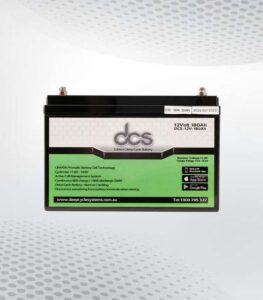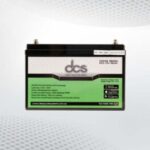Energising your home with an off-grid solar power system is a transformative decision, promising sustainability and independence from the conventional energy grid. The batteries that store the energy your solar panels harvest are key to this autonomy. Selecting the Best Batteries For Off Grid Solar Power isn’t just a matter of preference—it’s about efficiency, durability, and compatibility with your lifestyle needs.
Understanding Off Grid Batteries for Solar
Off Grid Batteries for Solar serve as independent units, free from the ties of the national electricity network. These setups are particularly beneficial in areas where grid connection is unfeasible or would incur prohibitive costs. Solar batteries are central to the functionality of such systems and play a pivotal role in energy storage. It captures the electricity solar panels generate during daylight hours, storing it for utilisation at night or when sunlight is scarce.
The battery choice significantly influences the effectiveness and self-sufficiency of an off-grid solar system. This makes it imperative to comprehensively understand the different battery types available and the factors that should guide the selection process. By exploring these considerations, one can ensure that their off-grid solar system is tailored to their specific needs and optimised for performance and sustainability.
Types of Batteries Used in Solar Off-Grid Systems
Choosing the correct battery type for an off-grid solar system is crucial in pursuing energy independence. The primary battery types used are as follows:
– Lead-Acid Batteries:
A traditional option known for their affordability and wide availability. They come in two main variants: flooded lead acid, which requires regular maintenance, and sealed lead acid, which is maintenance-free but has a higher cost.
– Lithium-Ion Batteries:
Praised for their high energy density and longer lifespan, they offer greater efficiency and a smaller footprint than lead-acid batteries. Their durability and low maintenance requirements often offset their higher upfront cost.
– Nickel-Cadmium (NiCd) Batteries:
Durable and capable of operating in extreme temperatures, NiCd batteries are less susceptible to the “memory effect” and offer a reliable option for rugged environments. However, environmental and disposal concerns limit their appeal.
– Nickel-Metal Hydride (NiMH) Batteries:
Offering a middle ground in cost, efficiency, and environmental impact between lead-acid and lithium-ion batteries. NiMH batteries have a decent energy density and are more environmentally friendly than NiCd batteries.
– Saltwater Batteries:
An emerging technology, these batteries use a saltwater electrolyte, positioning them as an environmentally friendly option. They are non-toxic, easily recyclable, and do not contain heavy metals, making them an intriguing choice for renewable energy systems focused on sustainability.
Each type presents its benefits and limitations, influenced by cost, lifespan, capacity, and environmental impact. These factors guide the choice towards the best fit for specific off-grid solar system requirements.
Criteria for Choosing the Best Batteries for Solar Off Grid
When venturing into selecting Best Batteries For Solar Off Grid, several pivotal factors must be deliberated to ascertain the most fitting option. Capacity, measured in kilowatt-hours (kWh), dictates the volume of energy a battery can store, a crucial element in meeting your power requirements. Equally important is the lifespan, which gauges the durability of a battery through its charge and discharge cycles before noticeable degradation occurs.
The Depth of Discharge (DoD) is another essential metric, indicating the proportion of the battery’s capacity that can be utilised without adversely affecting its longevity. Efficiency, the ratio of usable stored energy to the energy input, affects overall system performance. Lastly, cost considerations encompass the upfront expenditure and the operational and maintenance expenses over the battery’s operational life.
These criteria collectively inform the decision-making process, guiding towards a choice that aligns with your solar off-grid system’s immediate needs and long-term expectations.
Battery Size Matters: Determining the Right Capacity for Your Off-Grid Solar System
Selecting the appropriate battery capacity is pivotal in ensuring your off-grid solar system can adequately meet your energy needs, particularly during spells of diminished sunlight. This decision hinges on thoroughly analysing your household’s typical energy usage, incorporating an allowance for peak consumption periods and the potential for future system augmentation. It’s essential to factor in the daily energy consumption and the specific demands of high-usage appliances and devices.
Additionally, considering the system’s capacity to sustain energy requirements during consecutive days without sunshine is crucial for maintaining an uninterrupted power supply. Engaging a professional for an accurate evaluation can streamline this process, aiding in determining the necessary battery size and quantity to achieve a resilient and reliable off-grid solar system. This careful planning and calculation ensure that your system is under and over-dimensioned, optimising performance and cost-efficiency.
The Rise of Lithium-Ion Batteries in Off-Grid Solar Systems
Lithium-ion batteries are increasingly favoured for their exceptional performance in off-grid solar systems. Their prominence is owed to various advantages, including a remarkable energy density that ensures a compact footprint whilst providing substantial power storage capacity. This attribute is particularly advantageous in residential settings where space is premium.
Additionally, these batteries exhibit a significantly enhanced lifespan compared to their lead-acid counterparts, resulting in fewer replacements and reduced long-term costs. A notable feature is their high Depth of Discharge (DoD) capability, allowing a larger portion of the battery’s stored energy to be utilised without compromising its longevity. This efficiency maximises the utility of stored solar energy, especially during periods of limited sunlight.
Another appealing aspect of lithium-ion batteries is their minimal maintenance requirement, simplifying the upkeep process and further contributing to their growing popularity in off-grid solar applications. Their operational excellence and ease of use align well with the demands of modern off-grid living, marking a pivotal shift towards more reliable and user-friendly energy storage solutions.
Exploring Alternative Battery Technologies
As we venture into the evolving energy storage landscape, emerging battery technologies are carving out their niche within off-grid solar applications. Among these, flow batteries stand out for their unique mechanism, allowing for the separation of energy storage and power generation. This feature offers exceptional scalability and a potentially limitless lifecycle, as the liquid electrolytes can be easily replenished. Meanwhile, saltwater batteries emerge as a beacon of environmental sustainability.
Additionally, research into solid-state batteries promises to revolutionise the market with higher energy densities and improved safety profiles. These burgeoning technologies, each with distinct advantages and challenges, hint at a diversified future for off-grid solar storage solutions. They represent the cutting edge of research, where the quest for efficiency, sustainability, and reliability continues to drive innovation, making them a captivating area for further exploration and potential adoption in bespoke off-grid solar setups.
Maintaining Optimal Battery Life for Your Off-Grid Solar System
Adhering to proper maintenance practices is essential to extend longevity and ensure the efficiency of batteries within off-grid solar systems. For those utilising lead-acid batteries, routine inspections to monitor electrolyte levels and ensure they are kept within optimal parameters are critical. Equally, it’s important to avoid exposing these batteries to extreme states of charge or discharge.
Lithium-ion variants, although less demanding regarding upkeep, still necessitate occasional checks to guard against overcharging and verify that operational temperatures remain within safe bounds. Implementing a regimen of regular monitoring, adhering to the specific maintenance advice provided by the manufacturer, and utilising tools such as a Battery Management System (BMS) can significantly contribute to maximising the operational life of your storage solution.
Maintenance and Safety Tips for Solar Off-Grid Batteries
Ensuring your off-grid solar batteries’ safety and optimal performance necessitates adherence to specific maintenance routines and safety protocols. Below are key pointers to consider:
– Regularly inspect your batteries for any signs of damage or wear, such as cracks, leaks, or bulging, to prevent potential hazards and ensure they function correctly.
– Ensure that your battery storage area is well-ventilated to prevent the build-up of harmful gases, particularly if you’re using lead-acid batteries, which can emit hydrogen gas when charging.
– Keep the battery terminals clean and tightly connected to avoid corrosion and ensure efficient energy flow. Utilise a brush and a solution of bicarbonate of soda and water for cleaning.
– Avoid placing batteries in extreme temperatures; excessive heat can lead to overheating and capacity degradation, while cold temperatures can diminish their ability to hold a charge.
– Implement a Battery Management System (BMS) for lithium-ion batteries to monitor their state and manage charging and discharging processes, ensuring they operate within safe parameters.
By focusing on these maintenance and safety measures, you can enhance the durability and reliability of your off-grid solar batteries, contributing to a more secure and efficient energy system.
Future Trends in Batteries For Off Grid Solar Power Technology
 The horizon of Batteries For Off Grid Solar Power is alight with innovation as researchers and manufacturers tirelessly work to push the boundaries of what’s possible. Among the most anticipated advancements are solid-state batteries, which promise an increase in energy storage capacities and enhancements in safety features. These batteries could drastically alter the energy storage landscape, providing more compact, efficient, and durable options.
The horizon of Batteries For Off Grid Solar Power is alight with innovation as researchers and manufacturers tirelessly work to push the boundaries of what’s possible. Among the most anticipated advancements are solid-state batteries, which promise an increase in energy storage capacities and enhancements in safety features. These batteries could drastically alter the energy storage landscape, providing more compact, efficient, and durable options.
Additionally, there’s a significant shift towards developing more eco-friendly manufacturing and recycling processes. This includes efforts to minimise the ecological footprint of battery production and end-of-life disposal, ensuring that future batteries are powerful, long-lasting and kinder to the planet.
The drive for innovation also extends to exploring abundant and less harmful materials, which could lead to cost reductions and make off-grid solar power systems more accessible to a wider audience. As battery technology evolves, these advancements signify a step towards a more sustainable and energy-efficient future for off-grid living.
FAQ’s
1. What makes lithium-ion batteries preferable for off-grid solar systems?
Lithium-ion batteries are favoured for their high energy density and longer lifespan, offering more storage capacity in a smaller footprint and reducing the frequency of replacements.
2. How do I calculate the right battery size for my needs?
Determining the correct battery size involves the following:
- Analysing your daily energy usage.
- Considering peak consumption times.
- Accounting for periods of low sunlight.
A professional assessment is recommended for precise calculations.
3. Can I expand my battery storage system in the future?
Yes, many off-grid solar systems are designed with scalability in mind. However, it’s important to plan this with compatibility and capacity requirements in consideration, potentially consulting a specialist to ensure seamless integration.
4. What maintenance does my Batteries for Off Grid Solar Power require?
Maintenance varies by battery type; lead-acid batteries require regular checks for electrolyte levels, while Batteries For Off Grid Solar Power need minimal upkeep but should be monitored for operational temperatures and charging limits.
5. Are there environmentally friendly battery options for off-grid systems?
Saltwater batteries offer a greener alternative by avoiding heavy metals and harmful chemicals, aligning with the sustainability goals of renewable energy systems.
Conclusion: Energising Your Home with the Right Battery Choice
Selecting the Best Batteries for Off Grid Solar Power is a pivotal decision that directly impacts your home’s energy independence and sustainability. With advancements in technology and a deeper understanding of your energy needs, you can confidently choose a battery that meets your current lifestyle and adapts to future demands. Whether you lean towards the reliability and efficiency of lithium-ion batteries or explore emerging technologies, the right choice ensures a harmonious blend of performance and environmental stewardship.
| Other Good Articles to Read |
| Skank Blogs |
| Unreal Blogs |
| Tba Blogs |
| All City Forums |
| Dany Blogs |
| Refuge Blogs |
| The Music Blogs |
| Key Forums |
| Joe Blogs |
| Blogs 4 Me |
| Blogs Emon |
| Related Business Listings |
| Directory Submissions |
| Regional Directory |

